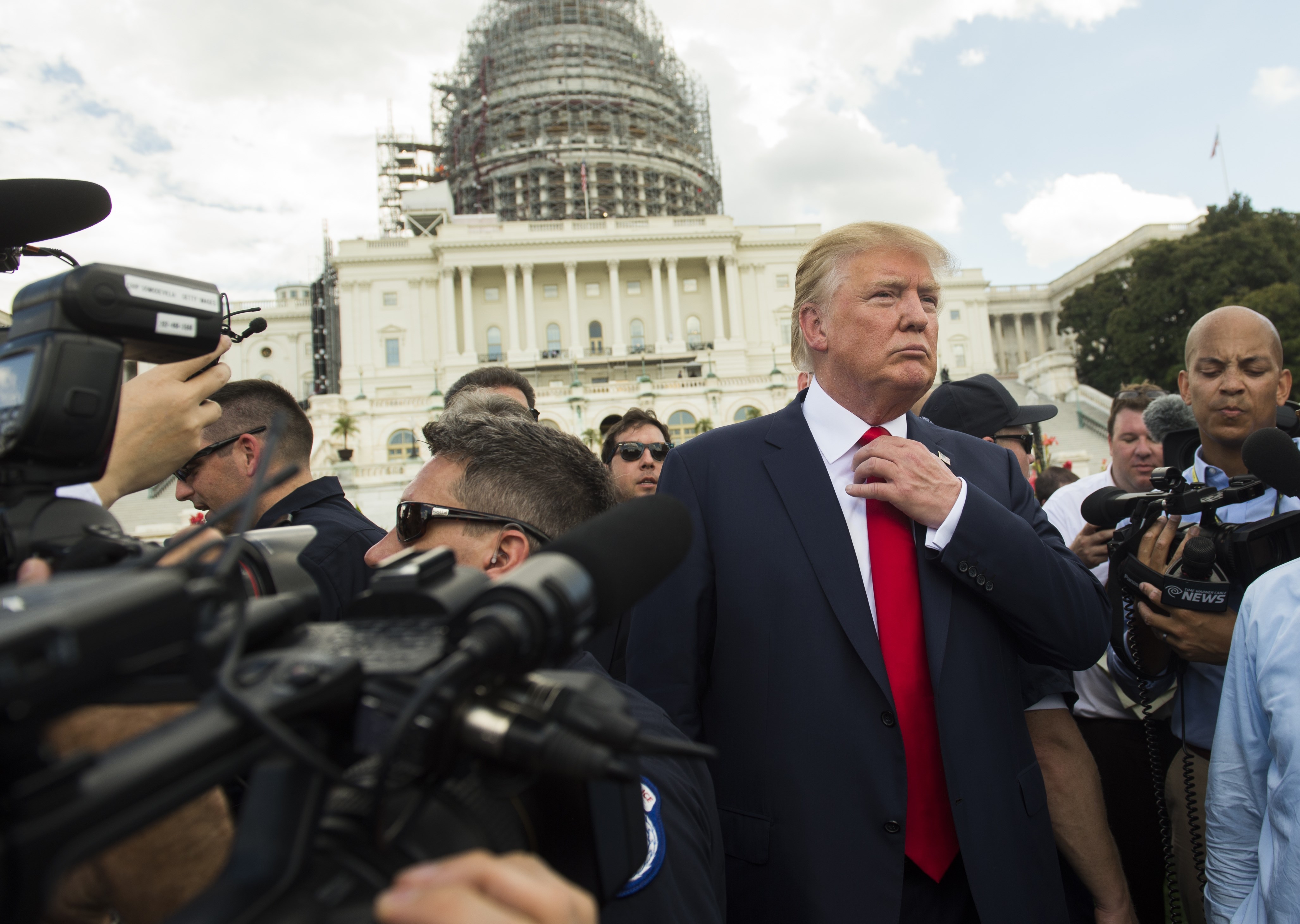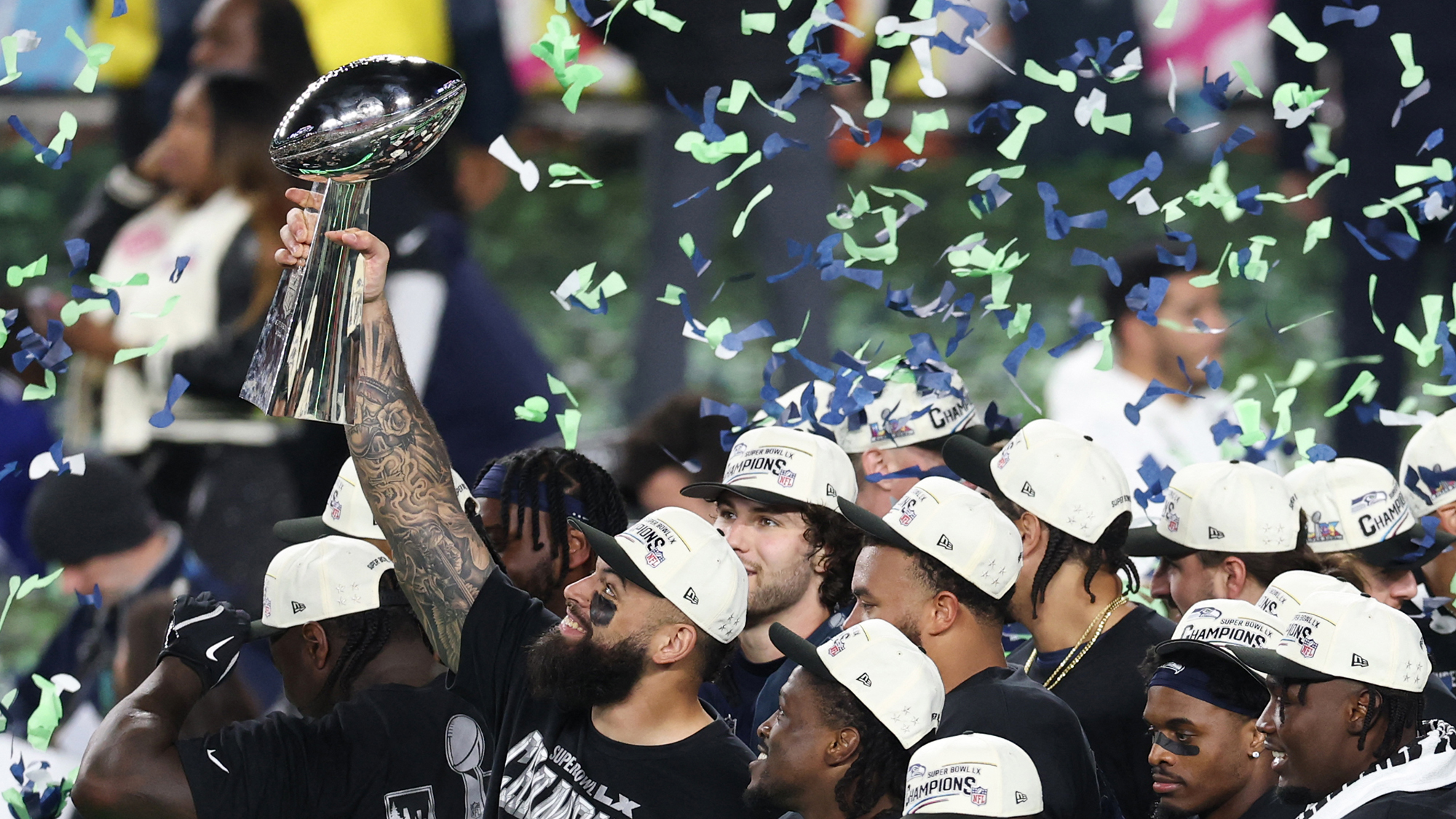Donald Trump is ready for his general election makeover
Remember Donald Trump, racist jerk? Meet Donald Trump, reasonable guy.


A free daily email with the biggest news stories of the day – and the best features from TheWeek.com
You are now subscribed
Your newsletter sign-up was successful
If you ask a Democrat about the prospect of Donald Trump being the Republican nominee for president, chances are you'll get one of two answers. The first is that it would be great for Democrats, because Trump would be easy to beat. The second is that while it certainly looks like he'd be easy to beat, you just never know. After all, Trump has confounded expectations at every step so far. So he might be tougher than he looks.
This is indeed a difficult question to answer, and the reason is this: We haven't yet met the Donald Trump who would be a general election candidate. We don't know for sure who that man will be, but it won't be the one we're seeing now.
But before we get to that, why is it that today's Trump looks beatable? To put it simply, it's because the general electorate is not the Republican electorate. Trump located and exploited certain feelings within the GOP base — disgust with Washington, fear of foreigners, resentment of immigrants, a particular strain of class envy that runs more to admiration than anger — and spun them into electoral success.
The Week
Escape your echo chamber. Get the facts behind the news, plus analysis from multiple perspectives.

Sign up for The Week's Free Newsletters
From our morning news briefing to a weekly Good News Newsletter, get the best of The Week delivered directly to your inbox.
From our morning news briefing to a weekly Good News Newsletter, get the best of The Week delivered directly to your inbox.
But much of what he's doing in the primaries makes a win in the general less likely. In particular, his ugly rhetoric about immigration has already alienated Latinos to a remarkable degree. While a number of analyses suggest that Republicans need around 40 percent of the Latino vote in order to win in 2016, Trump is now viewed negatively by almost all those voters; in a recent Washington Post poll, they favored Hillary Clinton over him by a margin of 73 percent to 16 percent.
Many candidates face a version of this problem: What you say to win a primary ends up hurting you in the general when you're trying to appeal to a wider range of voters. But that's usually a matter of ideology. In Trump's case, he's shown the whole country that he's a spectacular jerk (and a liar and a fool, but that's another story).
But everyone needs to realize that the moment he has the nomination sewn up, we're going to see a whole new Trump. In fact, we're already seeing hints of it. In his press conference after Super Tuesday, Trump said, "Look, I'm a unifier. I know people are going to find that a little bit hard to believe, but believe me, I am a unifier. Once we get all of this finished, I'm going to go after one person, that's Hillary Clinton." And he has offered hints before. "I will be changing very rapidly," he recently told Greta Van Susteren. "I'm very capable of changing to anything I want to change to."
This is precisely what conservatives fear about him: that he has no ideological moorings, and will be happy to abandon their ideas once he sees it being to his political advantage. And he will. When Trump faces a general electorate, he isn't going to be talking about his fervent support for gun rights or his passionate pro-life beliefs. He'll be talking about protecting Social Security and Medicare.
A free daily email with the biggest news stories of the day – and the best features from TheWeek.com
And the truth is that Trump's essential message — that America has become a rathole because our leaders are idiots — is much more likely to appeal to a general election audience than the more ideologically conservative message of his primary opponents. He doesn't toss the same kind of vitriol at Barack Obama that they do, and he isn't forced by conservative ideology to take unpopular positions like defending the Iraq War. You pretty much have to be a Republican to believe Marco Rubio's argument that Barack Obama has intentionally destroyed America with his socialist schemes, but you don't have to be a Republican to think that no one in Washington knows what they're doing, which is what Trump says.
He's also utterly shameless, quite happy to say, "No, I never said that" even when you present him with his own well-documented words. So I promise you, there will be positions he has taken in the primaries that he reverses himself on 180 degrees for the general, and he'll brush it off when people call him a hypocrite. Where the GOP's position is unpopular, he'll reject it, no matter what he has said before.
All that means that the general election version of Trump will be ideologically moderate, even liberal in some ways. He'll try to find a way to maintain his persona as a tough-talking truth-teller without offending people who constitute significant voting blocs — there won't be any more talk about Mexicans being rapists, and I'm guessing somebody who knows not to retweet things from white supremacists will be put in charge of his Twitter account. He'll keep being vague on policy, which allows voters to project on to him whatever they might like. He'll say that unlike those Republicans who constantly want to shut down the government, he's a dealmaker, ready to sit down with everybody and hash things out.
In other words, he's going to do his best to appear to be a reasonable person, so that enough of the voters now rejecting him say, "You know, maybe he's not such a bad guy after all."
Will it work? There's no way to know. But it just might.
Paul Waldman is a senior writer with The American Prospect magazine and a blogger for The Washington Post. His writing has appeared in dozens of newspapers, magazines, and web sites, and he is the author or co-author of four books on media and politics.
-
 Hong Kong jails democracy advocate Jimmy Lai
Hong Kong jails democracy advocate Jimmy LaiSpeed Read The former media tycoon was sentenced to 20 years in prison
-
 Japan’s Takaichi cements power with snap election win
Japan’s Takaichi cements power with snap election winSpeed Read President Donald Trump congratulated the conservative prime minister
-
 Seahawks trounce Patriots in Super Bowl LX
Seahawks trounce Patriots in Super Bowl LXSpeed Read The Seattle Seahawks won their second Super Bowl against the New England Patriots
-
 The billionaires’ wealth tax: a catastrophe for California?
The billionaires’ wealth tax: a catastrophe for California?Talking Point Peter Thiel and Larry Page preparing to change state residency
-
 Bari Weiss’ ‘60 Minutes’ scandal is about more than one report
Bari Weiss’ ‘60 Minutes’ scandal is about more than one reportIN THE SPOTLIGHT By blocking an approved segment on a controversial prison holding US deportees in El Salvador, the editor-in-chief of CBS News has become the main story
-
 Has Zohran Mamdani shown the Democrats how to win again?
Has Zohran Mamdani shown the Democrats how to win again?Today’s Big Question New York City mayoral election touted as victory for left-wing populists but moderate centrist wins elsewhere present more complex path for Democratic Party
-
 Millions turn out for anti-Trump ‘No Kings’ rallies
Millions turn out for anti-Trump ‘No Kings’ ralliesSpeed Read An estimated 7 million people participated, 2 million more than at the first ‘No Kings’ protest in June
-
 Ghislaine Maxwell: angling for a Trump pardon
Ghislaine Maxwell: angling for a Trump pardonTalking Point Convicted sex trafficker's testimony could shed new light on president's links to Jeffrey Epstein
-
 The last words and final moments of 40 presidents
The last words and final moments of 40 presidentsThe Explainer Some are eloquent quotes worthy of the holders of the highest office in the nation, and others... aren't
-
 The JFK files: the truth at last?
The JFK files: the truth at last?In The Spotlight More than 64,000 previously classified documents relating the 1963 assassination of John F. Kennedy have been released by the Trump administration
-
 'Seriously, not literally': how should the world take Donald Trump?
'Seriously, not literally': how should the world take Donald Trump?Today's big question White House rhetoric and reality look likely to become increasingly blurred
